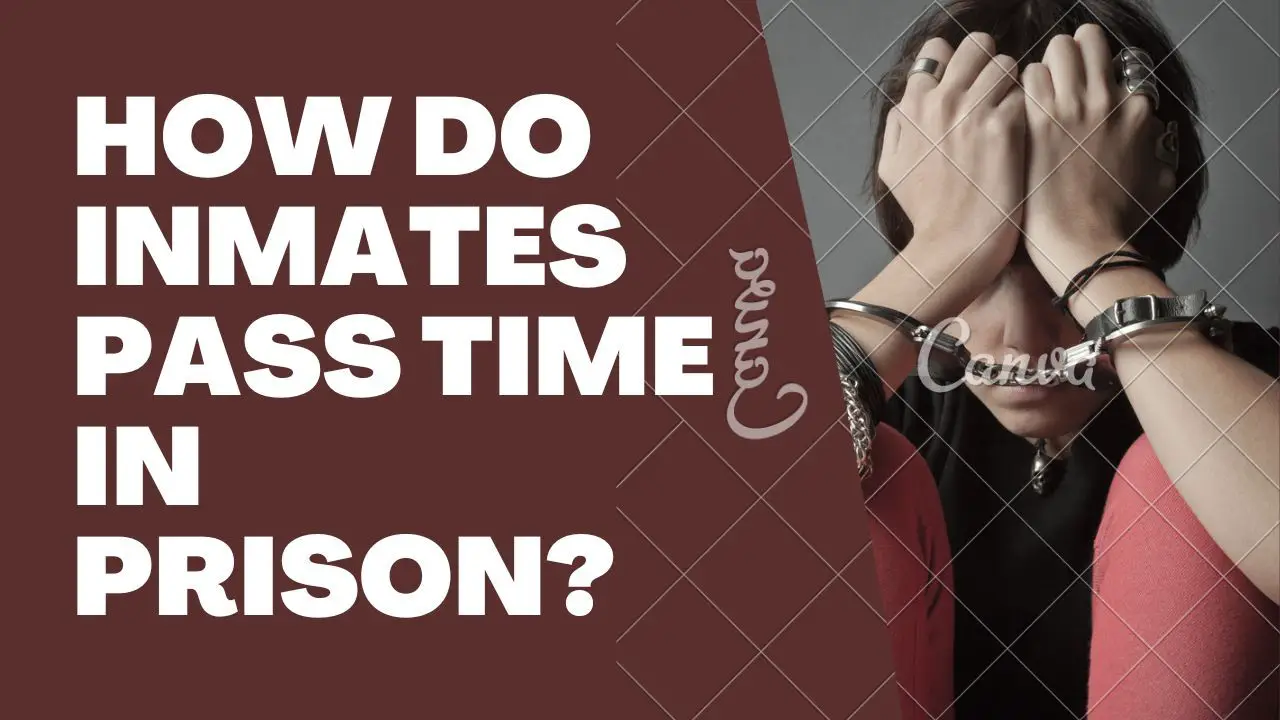How do Inmates Pass Time In Prison?
How do Inmates Pass Time In Prison? This article discusses everything you need about how prisoners spent time in prisons. If your family member is in Jail or prison, or you are scheduled to go to prison and need some ideas about how Inmates pass time in prison? This article will help you.

When people think of prisons, they often imagine a place of violence, danger, and despair. While some prisons may be like that, the reality for most inmates is much different. In fact, one of the biggest challenges for many inmates is boredom.
With little to do and long hours to fill, inmates have to find ways to pass the time. And that is what we are going to discuss today. In this blog post, we will discuss with you 12 ways that inmates pass their time in prison.
So without further ado, let's dive into our today’s blog.
12 Ways Prisoners Spend Time In Prison
The following are some of the ways prisoners or inmates spend time in Prison:
- Sleeping
- Working out
- Watching TV
- Write letters
- Reading books
- Play Chess
- Religious practices
- Gambling
- Studying
- Learning a skill
Sleeping:
In prison, sleep is a precious commodity. With the strict schedule and constant noise and activity, getting a good night's rest can be difficult. However, prisoners often take advantage of any opportunity to catch up on sleep, such as during lockdowns or any time when they are not doing something else. They may also try to create a conducive environment for sleep by using earplugs, eye masks, and extra blankets to block out the noise and light.
Read 10 Worst Prisons In Russia
Find Ways to Work Out:
Staying physically active is important for both physical and mental health, and prisoners are no exception. While the days of heavily-stocked prison gyms may be gone, inmates can still find ways to work out and build muscle. Many facilities offer access to outdoor spaces like basketball courts and running tracks, and inmates can participate in organized sports teams and fitness programs.
They can also do bodyweight exercises like push-ups, sit-ups, and squats in their cells. Some inmates even get creative and make their own exercise equipment, such as filling trash bags with water and using a broom to make a barbell, though this is usually against the rules. In any case, finding ways to stay active and maintain physical health is important for prisoners to pass the time and improve their well-being.
Watch TV:
TVs have become a popular pastime in prisons, with many inmates watching hours of broadcast networks to pass the time. Some prisons even have large common rooms with a TV, where inmates gather to watch together. However, access to cable TV is limited and expensive, so most prisoners are stuck with the basic channels. Some prisons also limit TV viewing hours or require inmates to pay for the privilege.
Write Letters:
Inmates have limited access to phones and email, with mobile phones strictly prohibited in most prisons. Therefore, letter writing has become a popular way for inmates to communicate with loved ones and pen-pals. Many inmates find solace in putting their thoughts and feelings down on paper, and receiving letters from the outside world can provide a much-needed sense of connection.
Play Chess:
Chess is a mental game that requires strategy and concentration, making it a popular pastime among inmates looking to pass the time. Many prisoners become skilled at the game over time and may even participate in prison tournaments. Chess can also provide a sense of camaraderie among inmates as they challenge and learn from one another. However, access to chess sets may be limited, so some inmates create makeshift sets using paper and other materials.
Religion
Religion plays a significant role in the lives of many inmates, offering them a sense of hope, purpose, and guidance. In prison, where time can feel like it stands still, many inmates find solace in their faith. Prisons often have chaplains and religious services to accommodate the diverse religious needs of their inmates.
Some inmates choose to follow a specific faith, while others turn to religion as a way to cope with their difficult circumstances. Many religious groups offer counseling, group meetings, and individual sessions to help inmates find peace and forgiveness. Some inmates participate in prayer groups, Bible studies, or religious ceremonies to feel a sense of community and belonging.
In addition to providing emotional support, religion can also offer practical benefits for inmates. Many faith-based programs offer educational opportunities, job training, and other practical skills that can help inmates transition back into society upon their release. Religion can be a transformative experience for some inmates that helps them turn their lives around and become productive members of society.
Read Bayside State Prison: Visiting Hours, Inmate Search, FAQ
Gamble on Pretty Much Anything:
In prisons, gambling is an accepted form of entertainment. It is illegal, but the rules are loosely enforced. Gambling takes place in almost every part of prison life, from the cell block to the yard, and involves almost anything that can be bet on. Inmates bet on everything from sports games to the outcome of legal cases to who will win a talent show.
Betting items often include food, commissary items, and even handmade crafts. Prisoners can spend hours playing cards or dice games, and it is not uncommon for some to get into debt as a result of their gambling activities.
Become a Jailhouse Lawyer:
Inmates who have a good understanding of the law can become jailhouse lawyers, helping other prisoners navigate the legal system.
These inmates are often highly respected by their fellow inmates and can become powerful advocates for those who can't afford legal representation. Some jailhouse lawyers are so skilled that they have successfully overturned their own convictions or those of other prisoners. This type of work requires a lot of reading, research, and writing and the ability to communicate effectively with other inmates.
Master a Skilled Trade:
Prisoners who take vocational training have a better chance of finding employment and reintegration into society after release. Vocational programs can range from basic skills training to advanced technology programs. Inmates can learn everything from basic computer skills to welding or carpentry. These programs are designed to teach inmates practical job skills and give them a chance to earn certifications or degrees. Vocational programs also positively impact inmate behavior and reduce the likelihood of returning to prison. By learning a trade, inmates can gain confidence in their abilities and have a better chance of becoming productive members of society.
Read Books:
Access to books is one of the few luxuries that inmates have. Libraries in prisons can be well-stocked and diverse, with donations coming from various organizations. However, some books are banned, including those with explicit content or references to homosexuality. Despite the limitations, reading can be an escape from the harsh realities of prison life. It can also be a valuable educational tool, with many prisons offering literacy programs and book clubs for inmates.
Working:
Working is a common way for inmates to pass the time and earn money. Prisons offer a range of jobs, from basic tasks like cleaning and laundry to more specialized positions such as cooking and carpentry. Inmates who work not only earn a small income but also gain a sense of purpose and accomplishment. Moreover, they can learn valuable skills that can help them transition back into society once they are released.
Make Handicrafts:
Some prisons have programs that allow inmates to make and sell handicrafts. These programs can offer inmates a way to channel their creativity and express themselves artistically.
From making pottery and jewelry to creating furniture, handicrafts can be a source of pride for inmates.
Additionally, these programs can teach inmates valuable skills that they can use to support themselves once they are released from prison. Other prisons offer educational experiences that include art and craft classes, giving inmates the opportunity to learn new skills and explore their creativity.
How Inmates Deal With Boredorm Wrap Up
While prison life may seem bleak, inmates find ways to cope and pass the time. From sleeping to working out and watching TV to mastering a trade, there are many ways that inmates can stay busy and productive. Despite the challenges of life behind bars, some inmates even manage to find a sense of purpose and fulfillment.
We hope this blog has helped you learn about inmates' lives in prison and how they spend most of their time.
You can also read more related articles;
